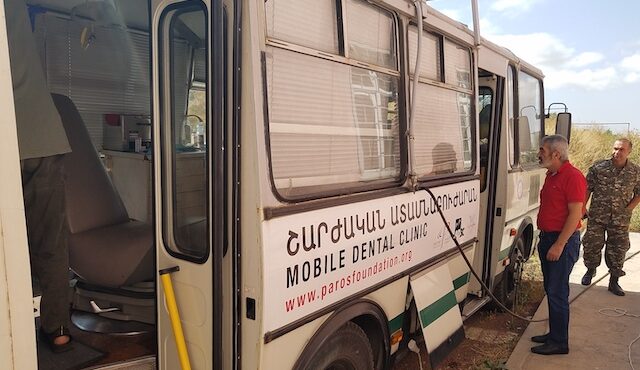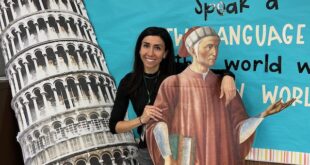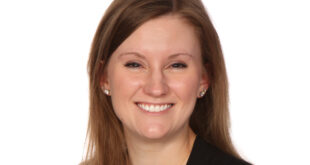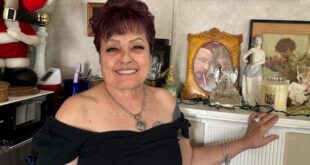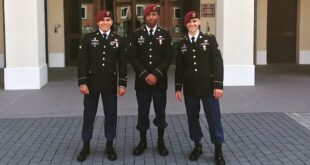Jeffrey Wittmus has no doubt about his purpose: to improve other people’s lives with his gift for dentistry.
“What I do is heal people, and I’ve never stopped trying to master that healing ability,” the Chicago dentist says. “I love being able to take someone and heal their mouth or their body, or their general self-esteem, or health in general, because a lot of general health comes from oral health. That’s why I am on this planet — and I’ll do it as long as I can.”
Wittmus, who has a doctorate in dental surgery from Northwestern University, has run a private practice for three decades while engaging in extensive philanthropy, including providing free dental care for children in war-torn border villages in Armenia for nearly 20 years.
His connection to Armenia is personal: his maternal grandparents were orphaned in 1915 during the Armenian genocide, which they miraculously survived, he explains.
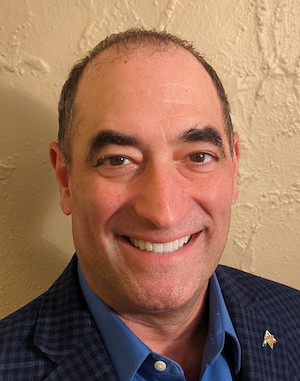 Wittmus’ other side of the family is Italian. His great-grandfather immigrated from Italy with his wife and nine children, who were orphaned after their father died while working on the New York City subway and their mother died of stress. Wittmus’ grandfather was sent to a foster home, changed his name, and eventually married a fellow Italian who also had been orphaned.
Wittmus’ other side of the family is Italian. His great-grandfather immigrated from Italy with his wife and nine children, who were orphaned after their father died while working on the New York City subway and their mother died of stress. Wittmus’ grandfather was sent to a foster home, changed his name, and eventually married a fellow Italian who also had been orphaned.
As a child, Wittmus says, he didn’t know much about the Armenian genocide, which wasn’t officially recognized by the U.S. government until President Joe Biden did so in 2021.
Wittmus’ first visit to Armenia came at the behest of his church priest, Fr. Aren Jebejian — now a U.S. bishop — who asked him to accompany him on a tour with a group of college students.
The trip included a visit to a free dental clinic in the Vayots Dzor region of southern Armenia that had been started in 1998 by Dr. Viken Garabedian, a dentist from Laguna Niguel, California. Wittmus was so impressed that he joined forces with Garabedian to start yearly pro bono summer trips with fellow dentists to the Armenian clinic, which he equated to “a summer camp.”
The children were transported for free from Artsakh, also known as the Nagorno-Karabakh region on the border of Azerbaijan.
“They would do religious, sports and cultural activities, and get their teeth fixed for free,” Wittmus explained. “We would typically go in for a week or two, and work 16-hour days for 7-10 days straight. We did as much as we could, which was quite a bit of work.”
The endeavor also included two mobile buses staffed by Armenian dentists, trained by the Americans, who provided free dental care to nearby villages. Based on U.S. dentistry prices, the entire operation equated to an investment of millions of dollars that included high-quality work and meticulous record-keeping, says Wittmus, whose humanitarian efforts have earned him the title of Academy of Dentistry International Fellow since 1995. He is also chairman of the Chicago Dental Society’s peer review committee, where he’s served for 22 years, and past president of the Arcolian Dental Arts Society, a Chicago-based organization of Italian dentists that named him “Arcolian of the Year” in 2021.
Unfortunately, the pro bono trips to Armenia stopped in 2019, first due to an armed conflict with Azerbaijan in 2020, followed by the COVID-19 pandemic and finally Russia’s invasion of Ukraine, which destabilized the region, Wittmus says.
Wittmus believes there hasn’t been enough media coverage of the plight of Armenians in the region. “It’s a very sad thing,” he says, “to have dedicated so much time, effort and money to rebuilding a small country trying to defend itself and create a democracy in an area where it’s not common… and to watch it all fall apart.”
Still, he hopes to resume his work there as soon as possible.
 Fra Noi Embrace Your Inner Italian
Fra Noi Embrace Your Inner Italian


